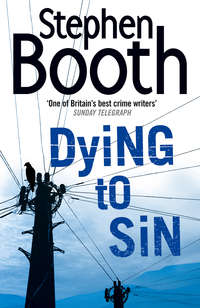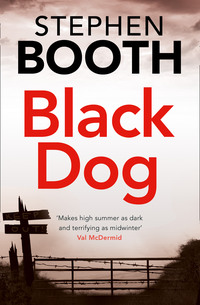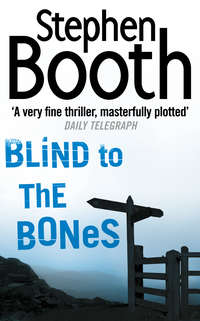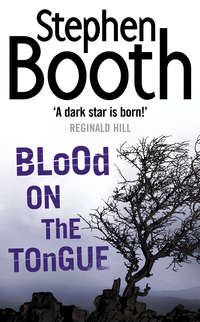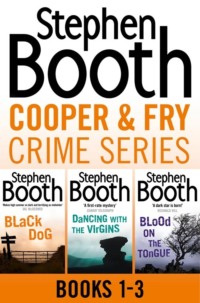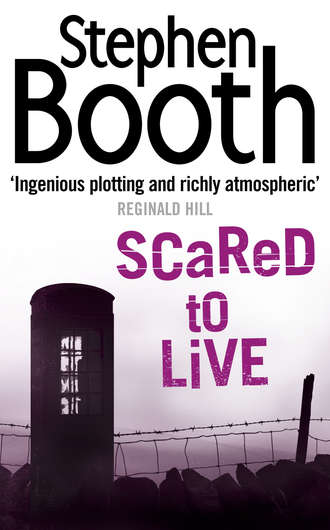
Полная версия
Scared to Live
‘Somerfield’s supermarket.’
‘I suppose that makes sense, does it?’
‘They have ATMs,’ said Cooper. ‘You know – cash machines.’
‘Yes, I know what an ATM is. Wait – you’re on the plastic crime initiative.’
‘Did you forget?’
‘No, I’ve been a bit busy this morning, that’s all.’
‘Something on?’
He heard Fry hesitate. ‘Don’t get excited. Just something I’d like you to take a look at when you’re finished. Get away as soon as you can, will you?’
‘Are you going to tell me what it’s all about?’
‘A house fire last night. Multiple fatalities.’
‘Where?’
‘One of the Edendale estates. The Shrubs, I think they call it.’
‘I know where you mean.’
For all the time she’d served in E Division, Fry still didn’t seem to know the area all that well. Perhaps she didn’t think it was worth the effort because she wasn’t intending to stay long enough. Yes, that was the impression she gave. A visitor caught in a depressing stop-over while she waited for a connection to somewhere better.
Cooper remembered a few of the initial reactions to Fry when she’d first transferred from West Midlands. ‘A bit of a hard-faced cow’; ‘Could be a looker, but she doesn’t bother’; ‘Too tall, too skinny, no make-up’; ‘Stroppy bitch’. None of them had been fair, of course. But Fry hadn’t done much to make herself popular with her colleagues. In fact she seemed to relish her image.
In the background, he could hear Judson answering a question. ‘A blank piece of plastic, embossed and encoded with a stolen account number. Some of these plastic crime merchants practically steal your identity.’
‘Can you hear me, Ben?’
‘Yes, you mentioned a fire on the Shrubs.’
‘Great. Well, three deaths. A mother and two children.’
‘Evidence of suspicious circumstances?’
‘Not yet. But …’
‘You’re expecting some?’
‘We haven’t had the forensics yet. But I want to know if you’ll be around.’
‘OK,’ said Cooper, trying not to sound surprised. ‘I’ll see you back at the office after the session with Steve Judson. Is that OK?’
‘Yes, that’s absolutely fine.’
When he ended the call, Cooper frowned. Somehow, Fry hadn’t sounded her usual self.
Judson caught his eye across the group and raised an eyebrow. ‘They get your PIN by focusing a camera on the keypad,’ he was saying. ‘At the end of the day, they retrieve discarded receipts. They match up the time of your withdrawal with the tape from the camera, and they’ve got both your PIN and your account number. They can produce a duplicate card and make fraudulent withdrawals as easily as if they’d stolen the genuine card. And you won’t even know anything’s happened until you see your next bank statement. That’s more than bingo – it’s the jackpot.’
Edendale District General was on the northern edge of town, occupying a greenfield site where new wards could be added as funding became available. Fry had never seen the old hospital on Fargate. It had closed years ago, its Victorian buildings so primitive and crumbling that nobody had bothered saving them from demolition. But its location must have been very handy. Even at this time of the morning, it would take her fifteen minutes to get across town to the new site, once she got away from Darwin Street.
‘Tell me again, who made the emergency call?’ she asked Murfin when he came off the radio to the control room.
‘One of the neighbours dialled 999 when he saw the smoke. Bloke by the name of Wade. A bit of a know-it-all, by the sound of him. FOAs took a statement earlier.’
‘You know, we should have made sure we had complete information before we came out.’
Murfin looked aggrieved. ‘You said you wanted to get the job out of the way as soon as possible. In and out, and turn it over to the coroner, that’s what you said.’
‘OK, Gavin, thanks.’ Fry didn’t like her words being quoted back to her, especially when she’d been wrong. ‘It’s a bit irritating, that’s all.’
‘Is that why you made me look in that last bedroom?’
She sighed. ‘It had to be done, Gavin. You aren’t here just to wreck the place and make stupid jokes. There was nothing in the bedroom, anyway.’
‘You didn’t know that at the time.’
‘Right. How come the hospital staff have more information than we do, eh? So the youngest child wasn’t even at home, but with the grandparents? It shouldn’t have needed a call to the ward sister to find that out.’
Murfin was silent as he watched her get into her car. ‘You know I’ve got kids of my own, don’t you?’ he said quietly, before she closed the door.
Fry bit her lip, caught out by a moment of tricky human emotion when she hadn’t expected it. ‘Sorry, Gavin.’
But he didn’t seem to have heard her as he walked away. And by the time she caught up with him later, he was back to his old self, so she didn’t mention it again.
* * *
Brian Mullen was in a side room off one of the newer wards, with a PC on duty outside the door. Mullen was in his early thirties, sandy-haired, with a faintly pink complexion, as if his skin had been freshly scrubbed. His hands were bandaged, but otherwise he looked quite fit and healthy.
He was also sedated and deeply asleep, as motionless as the dead. There was no point in asking questions of a comatose body.
‘Naturally, he was in a very distressed condition when he was admitted,’ said the ward sister. ‘Apart from his physical injuries.’
‘But otherwise he’ll be well enough to be interviewed later?’ asked Fry.
‘You’ll have to get permission from the doctor.’
Fry didn’t like hospital doctors much. They seemed inseparable from a smell of disinfectant and a tendency to interfere. White coats and professional obstinacy; both unwelcome obstacles when she was intent on finding the truth.
‘Were you on duty when Mr Mullen’s parents-in-law came in this morning, Sister?’
‘Mr and Mrs Lowther? Yes, I spoke to them myself. It was helpful they came, because we’ll be able to reassure Mr Mullen his daughter is safe, at least. She was with them last night, apparently. Oh, but you’ll know that – someone called earlier.’
‘Yes, thank you,’ said Fry. ‘So when will Mr Mullen come out of sedation?’
‘Some time this afternoon.’
‘I need to know as soon as he’s awake and fit to answer questions, Sister.’
‘I’ll inform the officer over there, shall I? I presume he’s going to carry on hanging around here making a nuisance of himself?’
‘I’m afraid so.’
‘Well, I hope we have less trouble with the patient when he wakes up. He almost injured one of my nurses when we had to sedate him earlier.’
Fry had been about to leave the ward, but she stopped halfway through the swing doors. ‘What do you mean, you had to sedate him?’
‘He was completely wild, shouting that he couldn’t stay here, he had to get out. You know, we see some troubled cases in this hospital, but Mr Mullen was in a dreadful state.’
‘He must have wanted to go back to his house. He knew his family were trapped in the fire.’
‘Probably you’re right …’ The sister hesitated, sounding doubtful. ‘I suppose it’s not my place to say this, but that wasn’t the way it seemed. If you’d asked me at the time, I would have said he was frightened.’
‘Frightened?’ Fry glanced back at Brian Mullen, lying motionless in his bed. ‘Well, whatever it was, I expect he’ll have forgotten it when he wakes up, won’t he?’
‘Not necessarily. It’s his brain and body that are sedated. Deep-rooted fears are in the subconscious. And the subconscious never sleeps.’
* * *
After a wasted trip across town and back, Fry was feeling even more irritable. When she pulled up near the Mullens’ house, she found just one miserable-looking uniformed officer standing outside the gate. He had his hands folded behind his back, and he was bouncing slightly on his toes, as if auditioning for a part in The Pirates of Penzance. At any moment, he might burst into ‘A policeman’s lot is not a happy one …’
‘Where’s the fire officer?’ she asked, when Murfin emerged from the house.
‘He’s nipped off to get a bit of something for a late breakfast, lucky bugger. He said to tell you he wouldn’t be long.’
‘SOCOs here yet?’
‘There’s someone on the way, I’m told.’
Fry looked around at her available resources. One Gilbert and Sullivan extra, and Gavin Murfin. There was nothing like trying to do things on your own, was there?
Coming up behind the same tractor one more time, Bernie Wilding had to slow down on the road between Foxlow and Bonsall. But the tractor driver pulled over into a lay-by to let him pass, and the postman saw that it was Neville Cross, who owned Yew Tree Farm. His land ran right up to the garden of Rose Shepherd’s property.
Bernie slowed to a halt alongside the tractor and tapped his horn to get the farmer’s attention.
‘Morning,’ said Cross.
‘Just thought I’d mention – I couldn’t get any answer at Bain House earlier on. You know, Miss Shepherd’s place? I wondered if you’ve seen her about at all?’
‘Can’t say I have. We don’t see her in the village much.’
‘No, I know. I thought it was a bit funny, though. Her post was still in the box from yesterday, too.’
The farmer nodded almost imperceptibly. ‘I’ll keep an eye out.’
‘Thanks a lot.’
Bernie waved and drove off, watching the tractor pull into the road again as soon as he’d passed. He’d probably get behind it again when he reached Bonsall. Sometimes he thought these farmers drove around the lanes all day just for the sake of it. They loved being a bloody nuisance with their tractors, and their trailers full of slurry. Now and then, Bernie wished he could put a bomb under one of them.
4
Lindsay Mullen’s parents lived on the hillside above Darley Dale, a couple of miles north of Matlock. Following the directions she’d been given, Fry watched out for the Shalimar Restaurant, then turned left into Northwood Lane and climbed the hill. The Lowthers’ address was near the top, a large bungalow with its rear windows looking down on the A6 from Bakewell.
She and Murfin had to walk a long way up a garden path to reach the front door. This was a garden that seemed to be mostly gravel and stone flags, apart from the obligatory water feature, and dozens of terracotta pots that didn’t contain very much.
‘I like this sort of garden. No plants.’
And Gavin was right. There was a birdbath, a sundial, a statue of an angel in ornamental stone. And so much furniture, too – a patio set on the terrace under a green parasol, a wooden bench in the shade of an arbour, and a garden barbecue on timber decking at a lower level. In the last few yards, they found themselves walking on cast-iron stepping stones in the shape of flattened tortoises, between solar lights like Edwardian gas lamps. Near the door stood a cast-iron chiminea with a mesh door, its surface just starting to rust.
A few minutes later, they were sitting with Henry Lowther in a conservatory, on either side of an oak coffee table that matched the flooring.
‘Sorry to bring you in here,’ he said, ‘but Luanne is asleep, and we don’t want to disturb her. It’s going to be stressful enough for the child in the next few weeks, poor thing.’
‘Luanne is your youngest grandchild, sir?’
‘Yes.’
‘How did she come to be here with you last night?’
‘We’ve been looking after her for a few days. Luanne hasn’t been sleeping through the night, you see. Poor Lindsay wasn’t getting much rest, so we offered to give her a break for a bit.’
‘I see. And are you coping all right yourselves? Talk to your family liaison officer if you need any help, won’t you?’
‘No, we’re fine,’ said Lowther. ‘Luanne needs us, and it’s best to have something to concentrate on. You know what I mean …’
Lindsay Mullen’s parents seemed to be quiet people – no sign of hysterics, or outbursts of anger. But Fry hardly caught a glimpse of Mrs Lowther before she disappeared, clearly on the verge of tears, her eyes already red from previous bouts of weeping.
‘My wife isn’t up to talking about it yet,’ said her husband. ‘I hope you understand.’
‘Yes, of course. I’m sorry to have to bother you with questions, sir.’
‘It’s something you have to do.’
It was much too warm for Fry in the conservatory. Looking around, she saw that the central heating radiator had an individual thermostat control. She wondered whether Mr Lowther would notice if she surreptitiously turned it down. But he was watching her too expectantly, the way people did sometimes after a sudden death, as if they thought she might be able to bring their loved ones magically back to life.
‘Could you tell me when you first heard about the fire, sir?’
‘Yes. Brian phoned to tell us. That’s our son-in-law.’
‘Brian did? What time was that?’
‘Good heavens, I’m not sure. It was in the early hours of the morning. I was too shocked to check the time. Well, I might have looked at the clock, but I didn’t take it in. Brian said he was phoning from the hospital – I remember that. At first, I thought it was him that had been in an accident, and I didn’t understand what he was trying to tell me. I suppose I was still half asleep.’
The conservatory was probably so warm because it was full of plants – fuchsia, tree ferns, bougainvillea. In the kitchen, Fry had noticed cacti and tradescantia, and a wooden herb wheel on the window sill. She might be ignorant of what grew in the countryside, but she was familiar with house plants. During a spell with a foster family who’d run a small-scale plant nursery in Halesowen, her job had been to write out the labels for the pots – and God help her if she got one wrong through not recognizing a species.
There would be spiders and small insects crawling among these plants, too. She’d tried to sit in the middle of the two-seater cane settee to keep away from the jungle, forcing Murfin to take one of the chairs.
‘How did Brian describe what had happened?’
‘Describe it? Well, he said he’d arrived home and found the house on fire. I gather he’d been out for the evening. Brian was very distressed, you know – understandably. And he’d suffered some injuries trying to get into the house. In the circumstances I’m surprised he had the presence of mind to call us at all. But I’m glad he did. I don’t know how we’d have heard about the fire otherwise.’
‘Well, we’d have found your details somehow, and a police officer would have called on you.’
‘That would have been worse, I think,’ said Lowther. ‘If anything could be worse than this.’
Mr Lowther was officially described in the forms as a managing director. In Fry’s experience, most managing directors looked as though they’d eaten too many corporate lunches and Rotary Club dinners. But Lowther didn’t. He was a big man, but had kept his leanness. Regular squash, or business not so good?
For a moment, Mr Lowther was distracted by the fronds of a tree fern that hung near his chair. He reached out to tear a bit off the plant, with the air of someone who had no idea what he was doing. When he leaned over, Fry noticed that Mr Lowther’s shirt buttons weren’t fastened properly. One hole was empty, and its button had been fastened too low, so that part of his shirt hung untidily over his waistband.
‘That was all Brian could tell me, really. He said that the house was on fire. And that he thought Lindsay and the children were still in there.’
‘What did you do?’
‘We went up there, of course – to Darwin Street. But the fire was all over by the time we arrived. They wouldn’t let us go into the house. So then we went to the hospital, but Brian was sedated. We sat around for hours before someone came and told us that Lindsay and the boys hadn’t survived. It was horrible. It seemed as though we were almost the last to know.’
‘It can feel like that sometimes. But people have their jobs to do.’
‘Yes, I know. But it doesn’t really make it any better. Can I ask you something now?’
‘Go ahead, sir.’
‘Do you have any idea how the fire started?’
‘Not yet. We think the seat of the fire was downstairs in the sitting room, but we need to examine the house more closely before we can be sure about anything.’
Mr Lowther’s gaze drifted away again, and Fry’s attention was caught by the traffic on the A6. It had slowed suddenly as an unexpected type of vehicle mingled with the cars and vans, displaying an entirely different pattern of movement. Even through the double glazing, Fry thought she could hear the creak and rattle. For a moment, she wondered if Pride and Prejudice was being filmed again somewhere nearby.
‘A stagecoach has just gone past on the road down there,’ she said. ‘It was being pulled by four big grey horses.’
‘Yes, they’re Dutch Gelderlanders.’
Fry turned, surprised to see Mrs Lowther standing in the doorway, her eyes dried, her voice almost steady, as if she’d made a great effort to bring herself under control.
‘Beautiful, aren’t they?’ she said.
‘Right. You’ve seen them before, then?’
‘Sometimes there are two of them drawing a landau.’
Henry Lowther glanced at the window, but didn’t seem interested. ‘The fire must have been caused by faulty wiring or something, I suppose. They’ll find out what went wrong, won’t they?’
‘We don’t know yet whether it was an accident,’ said Fry.
But Lowther shook his head. ‘No, no. It can’t have been started deliberately. I might just about imagine one of the boys playing with matches. But not arson.’
‘We should know soon enough, Mr Lowther.’
‘You don’t understand. There’s no one who could have had any reason to start that fire deliberately,’ he said. ‘It just isn’t possible. Lindsay would never upset anybody. And as for Jack and Liam –’
He stopped, as if finding himself unable to express the impossibility in the case of his grandsons. His anguished expression suggested that the idea of harming them was physically beyond comprehension. His wife caught a surge of his emotion and began to cry all over again.
‘What about Brian?’
‘He wasn’t even at home,’ said Lowther.
Fry watched him, trying to detect an accusatory note in his voice. But perhaps it hadn’t occurred to the Lowthers yet that their son-in-law ought to have been at home with his family, should have been there to protect them, even if it meant he’d have died in the fire too. It would come later, that anger, the readiness to find someone to blame, if only for not being there.
‘Nevertheless, do you think there might be anybody he could have got on the wrong side of? Someone who might want to take revenge on him?’
‘You’ve met him, haven’t you?’ said Mrs Lowther, between sniffs. ‘You can see he’s harmless. What could he have done to anybody to make them commit an evil act like that, just to get back at him? It doesn’t make sense.’
Her husband nodded. ‘Besides, Brian doesn’t mix with people who’d do that sort of thing. He’s a despatch manager in a distribution centre.’
On the corner table was a set of photographs in silver frames. Smiling faces, boyish grins, a baby balanced on someone’s knee – the Lowthers’ grandchildren. Fry could see that Jack and Liam were fair-haired, with the pale look of their father. But the baby, Luanne, was much darker. The biggest frame contained an entire family group – Brian and Lindsay with all three children, their youngest child held proudly out front, taking centre stage as if it was her birthday or something.
Fry felt an urge to pick the photos up and look at them more closely, but she was afraid it would distract the Lowthers’ attention. Pictures of the fire victims had already been obtained for the case files and the media. She could look at them back at the office, more safely.
Instead, she looked down at her notebook. ‘Could we talk about the house for a few minutes? I mean, your daughter’s address in Darwin Street. I presume you know it quite well?’
‘Yes, of course,’ said Mrs Lowther. ‘We go there often. We were with them when they moved in. I helped Lindsay choose some of the furniture.’
Hearing that, Fry knew she’d have to pick her words carefully when she asked the next few questions, or she was likely to lose Moira Lowther altogether. The untreated polyurethane foam wasn’t her fault, but guilt knew no logic.
‘First of all, the smoke alarm. They had one installed in the kitchen.’
‘Yes, it was installed as soon as they moved into the house. Brian insisted on it.’
‘Who advised him where to put it?’
‘Advised him? I don’t think anyone did. The kitchen was the obvious place. It’s where accidents are most likely to happen.’
‘I see.’
Of course, in one way the kitchen was the obvious place for a smoke alarm. Every day, the fire service could be guaranteed a tea-time call-out to an overheated chip pan somewhere. But if Brian Mullen had bothered to read the manufacturer’s instructions he would have seen a different recommendation. If he’d taken any notice of it, he might have kept his family alive. But there were too many ‘ifs’ in that equation.
Nevertheless, Fry filed away the impression of Brian Mullen as the sort of man who’d toss the instructions disdainfully aside as he whipped out a screwdriver and relied on his masculine instincts to get the job done.
‘Lindsay was proud of her kitchen,’ said Mrs Lowther. ‘It’s not six months since she had new units put in, and a canopy cooker hood with a double extractor. It was immaculate.’
‘Yes, I’ve seen it,’ said Fry. ‘I wonder, during the past few weeks, did Lindsay or Brian mention anyone hanging around near their house, or someone suspicious coming to the door?’
‘No, not at all.’
Before much longer, Fry had exhausted her questions. To be honest, she was glad to get out of the conservatory and away from the plants.
‘What sort of business do you run, sir?’ she asked.
‘I own a very successful export company. We deal mostly in machine tools, which we sell all around the world. We’ve been planning a shift towards computer technology, but that’s not our core business right now.’
Not a wholesale florist’s, then. She’d just wondered. As they went back through the house, she saw begonias and chrysanthemums in the living room. And there were foliage plants everywhere: monstera, yucca, palms. It was like the hothouse at Kew in here.
‘Oh, you have a visitor,’ she said when they reached the door.
A man was coming up the path towards the Lowthers’ door. He was taking his time, pausing to smile sadly at the stone angel, stepping carefully on the flattened tortoises. He looked to be in his mid-twenties, smooth faced and wearing an overcoat of a kind that you didn’t see very often these days. Fry wondered if he was a journalist.
‘Oh, it’s John,’ said Mr Lowther. ‘Our son.’
‘Does he live here?’
‘No, he has his own apartment, in Matlock. Poor John, he’s very upset – he and Lindsay were so close.’
‘Is he older than your daughter?’
‘No, two years younger.’
John Lowther looked at Fry and Murfin curiously as they met on the porch step.
‘These people are the police, John,’ said his father. ‘They’re here about Lindsay and the boys.’
‘We were close. Did they tell you?’
‘Your parents? Yes, they did.’
‘I’m shut up completely.’
‘I’m sorry?’
But Lowther was looking at Gavin Murfin. ‘I like your tie.’
Murfin looked aghast at getting a compliment. ‘Er, thanks.’
‘Are you all right, Mr Lowther? I know it must be a very difficult time for you.’
His eyes travelled back towards her, but failed to focus. ‘Pardon? What did you say?’
‘Have you thought of seeing your doctor?’
Lowther laughed. ‘I don’t see my doctor, because he’s not here.’
He went into the house, where his mother greeted him with a sob and a hug. Fry and Murfin walked back to the car. For a few moments, neither of them spoke. Then Fry started the engine and drove slowly back down the road.


